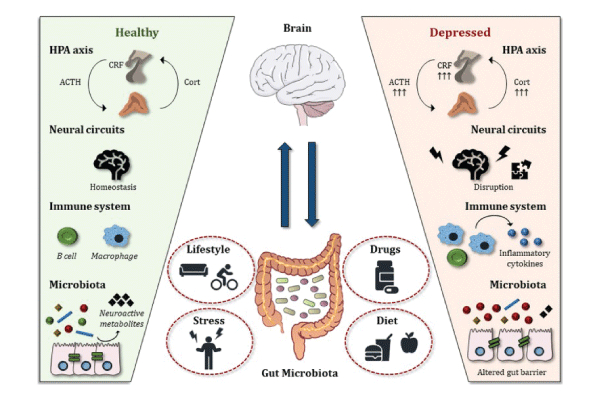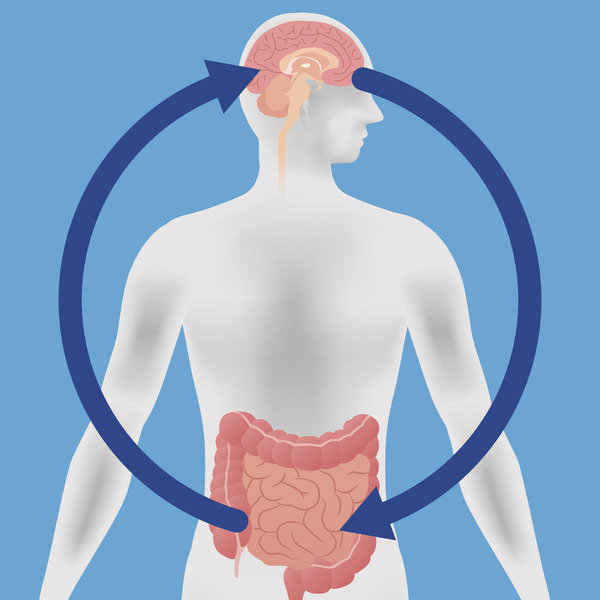The gut-brain connection refers to the intricate bidirectional communication between the gastrointestinal tract and the brain. Stress, anxiety, and other mental health factors impacts the balance between the gut-brain axis. This communication network exists between the central nervous system and the enteric nervous system in the digestive tract.
The human central nervous system (CNS) comprises of the brain and spinal cord. The CNS is a network of neurons, glial cells and other supporting structures that serves to aide communications between various parts of the body. The brain has multiple, diverse functions.
The cerebral cortex’s role is in conscious thought and decision-making, whereas the limbic system influences our emotions and the brainstem’s control over basic bodily function. The limbic system is a collection of structures primarily in the hippocampus and hypothalamus that regular functions that range from emotion to learning to memory.
Understanding the “Second Brain”
The Enteric Nervous System (ENS), often referred to as the “second brain” is important in helping to regulate digestion. It consists of millions of neurons that can operate independently from the central nervous system. Located in the walls of the gastrointestinal tract, the ENS manages essential functions. Digestive functions such as peristalsis, nutrient absorption, and secretion of digestive enzymes are managed by ENS. While the ENS can operate without input from the CNS, it often communicates bidirectionally with the CNS and unifies the digestive process with the needs of one’s body.
The enteric nervous system plays a crucial role in regulating digestion by coordinating the activities of the digestive organs such as the esophagus, stomach, small intestine and colon. Chronic stress can lead to a range of digestive issues such as indigestion and altered bowel movements. The release of stress hormones such as cortisol and adrenaline can affect the gut’s motility and sensitivity. Emotional well-being influences the composition of gut microbiota, microorganisms that lave been linked to digestive disorders. Without maintaining healthy gut flora, various digestive conditions can arise.
Gut Brain Connection and Digestive Disorders
- Irritable Bowel Syndrome (IBS): Chronic stress can exacerbate the symptoms of IBS, such as abdominal pain, bloating, diarrhea, and constipation. Stress can alter the gut motility, increase intestinal permeability, and dysregulate the gut-brain communication.
- Inflammatory Bowel Disease (IBD): Chronic stress can worsen the symptoms of inflammatory bowel diseases like Crohn’s disease and ulcerative colitis. Chronic stress increases inflammation in the gut and alters the gut microbiome.
- Stomach ulcers: Chronic stress can increase the production of stomach acid, leading to the formation of stomach ulcer or exacerbating existing ones.
- Heartburn and acid reflux: Stress can relax the esophageal sphincter, allowing stomach acid to flow back into the esophagus, causing heartburn and acid reflux.

Nurturing digestive harmony can be achieved by a multitude of ways. Incorporating mindfulness practices such as meditation and physical activities such as yoga on a regular basis can positively help both mental health and digestive wellness. Another way to influence the mental health and digestive relationship is by incorporating foods rich in probiotics, prebiotics and omega-3 fatty acids to strengthen the gut-brain connection.
Good Bacteria in One’s Digestive System
Probiotic rich foods in the diary category include yogurt and kefir. Pickled foods such as sauerkraut, kimchi and even pickles, as well as kombucha should be considered. Foods that are fermented usually fall into the probiotic category. (Natto anyone?) Foods that naturally contain prebiotics include onions, garlic, almonds and bananas. What is the difference between prebiotics and probiotics? Prebiotics act as food for the good bacteria in your digestive system, and stimulates growth.
Probiotics on the other hand add to the population of good bacteria in one’s digestive system. Omega-3, usually linked to heart health, consists of two components, EPA and DHA. Preliminary research has been delving into the qualities of DHA as being beneficial for the brain as well. Omega-3 fatty acids are found in seafood, such as salmon, tuna, trout, crab, mussels and oyster.
As always, all of the above is for information purposes only, and is not to be taken as medical advice. Please see your medical doctor for formal advice.
As we consider and implement aspects into a healthy lifestyle, recognizing the relationship between mental health and digestive wellness is important. By understanding the gut-brain connection, we allow ourselves the ability to adopt lifestyle changes that creates harmony between our minds and digestive systems.
Barry Schustermann
Follow me on X @BarrySchust
Follow me on Facebook @Barry Schustermann



